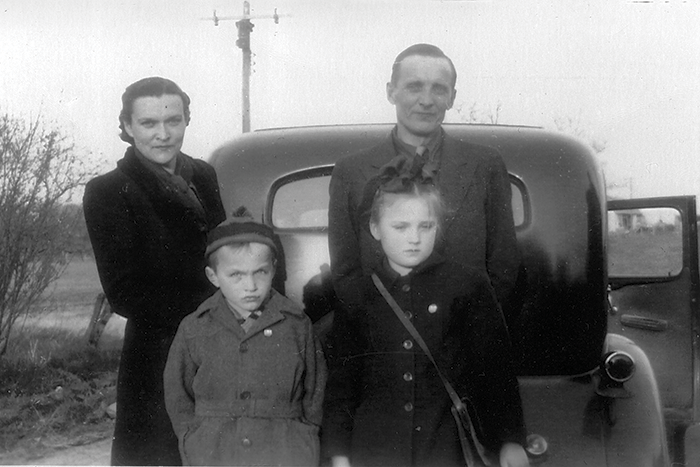Gift of Refuge

The Treicis family arriving in York Springs, Pa., in 1949. Photo courtesy of Mara Treicis Beliveau '63.
by Michelle Simmons
The black-and-white image feels so familiar: the family of four standing behind their car, the passenger door hanging open, as if they had been on a Sunday drive and decided to stop just then for a photo opportunity. The mother, father and son look directly at the camera, while the daughter seems to have been caught in a reflective moment, her gaze directed elsewhere.
The image is dated April 1949, and it marks the Treicis family’s arrival in York Springs, Pa., after fleeing Latvia in advance of the Soviet army during World War II and spending five years trekking from one refugee camp to another.
“There were people being rounded up and sent to Siberia,” Mara Treicis Beliveau ’63 begins. “Word was they were separating children from their parents and raising them in the Soviet system. So we hitched horses to a wagon and set off to the port of Liepāja. There we boarded a ship for Germany.
“I’m not sure where we landed,” she continues. “We wandered around. My father was getting odd jobs, and when the war ended in May 1945, we found ourselves in the American sector, in displaced persons camps.”
Then in 1949, the family gained passage to Boston—for a price. “My father was obligated to work for a farmer in Pennsylvania for two years,” she says. “We arrived in April; he died in November.”
Her mother, Austra, took a sewing job at the Tressler Lutheran Home for Children, in Loysville, Pa., eventually becoming a house mother there. In 1960, when Beliveau, then a sophomore at Dickinson, moved into Drayer Hall, Austra joined her—as house director. “I think it was the happiest she had been since leaving the homeland,” says Beliveau. “She loved being there, she loved the girls.”
And the “girls” loved her right back. “Mrs. T., as she was addressed by all the coeds, was a nurturing person who was genuinely interested in the lives and personalities of the students,” says Karen Davis Thompson ’65, adding that she was especially drawn to Treicis because her own father had been killed while serving in the South Pacific during World War II. “While our experiences were not the same, I believe we gravitated toward each other because there was some common thread of ‘sympathique.’ ”
Treicis often hosted afternoon tea in her apartment, sharing stories of life in Latvia before the war and counseling her young charges. Carol Anne Raskopf Ances ’65, who was a resident advisor in Drayer during her junior and senior year, lived next door. “I used to go in and just talk with her,” Ances recalls. “She felt things very deeply; she was the kind of person who embraced warmth and affection. She wasn’t really a mother figure, but close to it.”
She also enjoyed the opportunity to indulge her horticultural interests. “She had African violets in all the windows in the hall,” notes Beliveau, and another photo in her collection shows her mother tending a campus rose garden. “We shared a love of birds, of waiting for the spring,” adds Ances, noting that one of her most treasured gifts from Treicis was a doily meticulously stitched with spring flowers: irises, violets, primroses and many others.
Treicis continued working at Dickinson—remaining at Drayer Hall the entire time—until her retirement in 1976. By then, Beliveau, a political science major, had taken a position at the CIA as an analyst, married, moved to Massachusetts and started a family. Her brother, John Treicis ’65, also had moved out of state for a career in the IT industry.
In 1988, she relocated to Massachusetts to spend her final years with Beliveau. Ances, whose daughter was attending Emerson College in Boston, often stopped by on her way to see her daughter. When Treicis died in 2003, at age 91, Beliveau established a scholarship fund at Dickinson in her memory. She also returned to Latvia and located her mother’s family farm, scattering her ashes there.
Last year, during their 50th reunion, Thompson, Ances and other Drayer alumnae recalled Treicis’ impact on their lives, and now they hope to help build that scholarship fund for future Dickinsonians. “Mrs. Treicis was not a faculty member, but she was a professor of life—how to cope and how to survive,” says Thompson. “Before there were academic programs of women’s studies, she was a living role model right in front of us, representing the untold stories of women and their children who keep creating new lives out of the ashes of the old.”
Learn more
Published April 22, 2016